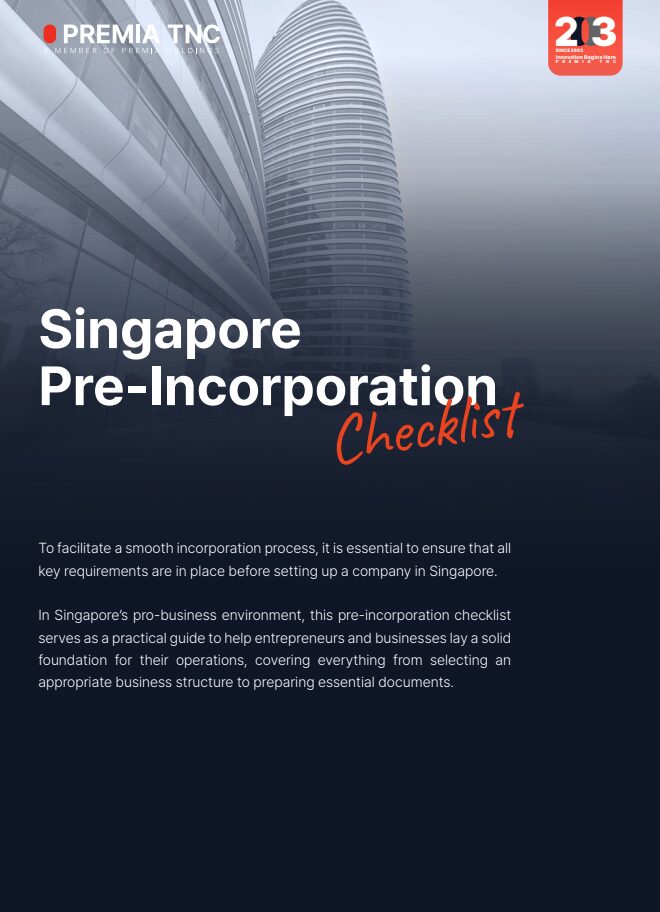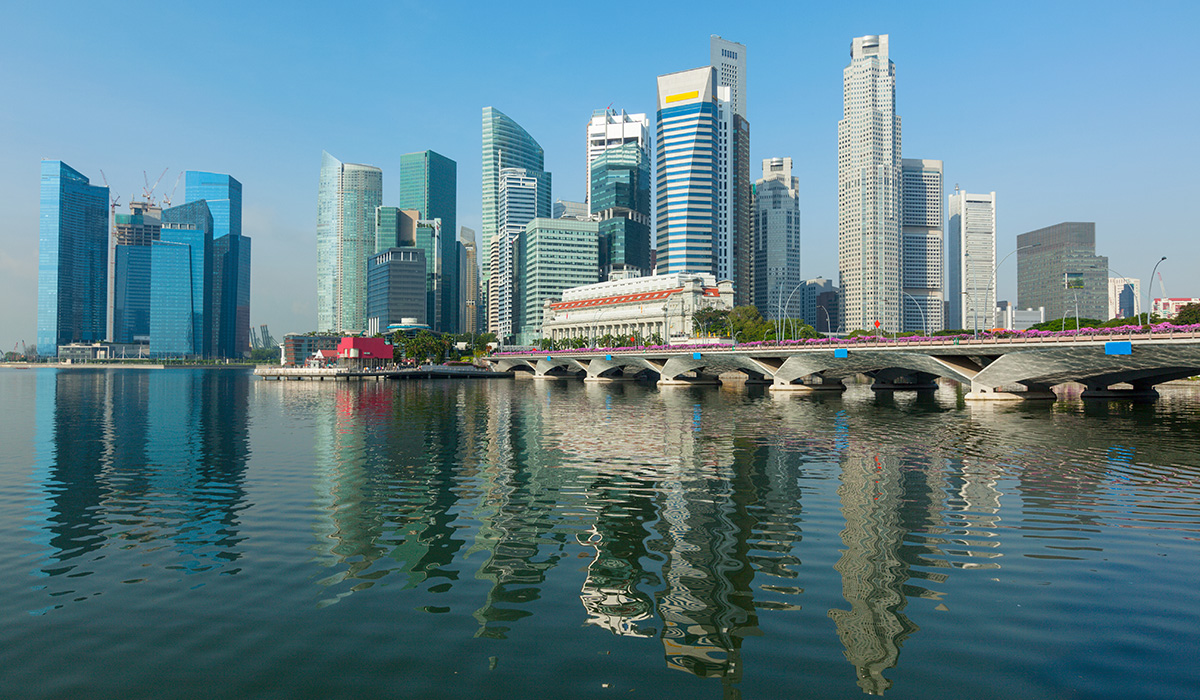

An excellent place to start when creating your global holding structure is by forming a holding company in Singapore. Several multinational organizations have constructed their holding structures throughout the world to grow their operations and reduce taxable income, including in Singapore.
Numerous industry behemoths, like Berkshire Hathaway, DBS Group, and Alphabet (Google), have established their holding or subsidiary corporations in the city-state. Singapore is one of the best locations to start a holding company because of many factors. The ease of Singapore incorporation and its advantageous tax system are the most significant advantages.
Defining the Singapore Holding Company Structure
A Singapore holding company is a distinct legal entity that primarily holds controlling shares in other companies, termed subsidiaries. It does not engage in operational activities itself but rather possesses full or majority ownership of its subsidiaries, thereby exerting influence over their strategic decisions and operations.
Characteristics of a Singapore Holding Company Structure
To establish a Singapore holding company, it is imperative to secure a pre-approved company name and ensure the presence of at least one resident director domiciled in Singapore. The holding entity is mandated to possess a registered address situated in Singapore. This meticulous process underscores the importance of attention to detail and adherence to regulatory protocols in the establishment of such corporate entities within the Singaporean jurisdiction.
Differentiating Between Holding and Parent Companies
A parent company is legally mandated to prepare consolidated financial statements for a group, including itself and its subsidiaries, under the Companies Act. Thus, if a holding company is required to file group financial statements, it also qualifies as a parent company in accounting terms. While holding companies typically exist solely to manage subsidiaries, parent companies often engage in operational management alongside ownership and oversight of subsidiaries.
Types of Holding Companies in Singapore
In Singapore, there are two distinct types of holding companies: investment holding companies (IHCs) and financial holding companies. IHCs are the standard corporate form for businesses outside of the insurance, banking, and finance sectors. On the other hand, financial holding companies are specifically designed for those who own businesses within the banking, insurance, and finance industries.
The Perks of a Singapore Holding Company Structure
Singapore should be at the top of your list if you’re considering building a holding structure. The Singaporean regulatory environment may provide many benefits when establishing a holding company.
Loss Reduction and Versatile Management
The number of subsidiaries and other assets your Singapore holding company may own is unrestricted. Furthermore, you are free to base the subsidiaries anywhere in the world, including Singapore.
By forming the company under a limited liability structure, liability protection can be ensured. A successful subsidiary will undoubtedly be advantageous to your holding company. However, your holding company will only suffer a loss on the owned shares if the subsidiary performs poorly or even fails.
In other words, the controlling company is not responsible for any subsidiary’s debts or liabilities.
Always keep safety in mind. At the subsidiary level, the same protection stands. The obligation of one subsidiary will not spread to another as long as each subsidiary has its unique legal entity position. As a result, each company unit should have its unique corporate entity. In this way, the holding structure’s companies won’t be impacted if one of the units collapses.
A holding structure may also result in better funding. Your Singapore holding company, for example, can flexibly use the earnings gathered to reinvest in or promote potential subsidiary companies.
Group Solace
A “group relief” procedure permits one company to transfer “loss items” to another company that is a part of the same group. The loss items may consist of the following:
- Unabsorbed capital allowances for the current year
- Unrecoverable trade losses for the current year
- Unused donations from the current year
The loss of some items of one company may be utilized to offset the revenue of another subsidiary in the holding structure under the relief system. The company that transfers losses is known as the transferor, while the entity that receives full losses is referred to as the main claimant.
Effortless incorporation
In Singapore, a holding company might fall under various business categories. Such entities include limited partnerships, and private companies limited by shares, which are commonly known as limited liability companies. Private limited companies are the most popular among them. Its distinct legal status, the limited liability of its members, and its eligibility for numerous tax-cut programs are the causes.
Online incorporation of a private limited company in Singapore can be completed in a few days. You will only need to provide the required documentation and the necessary information with the assistance of a reputable service provider. The service provider will submit the application on your behalf.
Tax Benefits In Singapore For Holding Companies
Singapore offers several tax benefits for holding companies, particularly concerning foreign-sourced income. Dividends from foreign subsidiaries can be exempt from Singaporean corporate tax if certain criteria are met, including a minimum foreign tax rate of 15% in the subsidiary’s country of residence. Additionally, Singapore operates a single-tier corporate tax system, where corporate profits are taxed only once. Dividends received by Singaporean parent companies are not taxed, and there are no withholding taxes on interest payments from subsidiaries.
Furthermore, Singapore does not levy capital gains tax or transfer taxes on the sale of shares, providing a favorable environment for asset sales. However, gains from asset sales may be subject to income tax if they are a company’s primary source of income and the holding period is short.
Singapore’s extensive network of Double Taxation Agreements (DTAs) with around 100 nations offers additional benefits. Under DTAs, dividends, interest, and royalties received by Singaporean holdings from treaty countries may be subject to lower taxes or even exempt from withholding taxes.
To qualify for DTA benefits, the Singapore holding must be considered a tax resident in Singapore, as determined by the “control and management” test. This test assesses whether strategic decisions and control are exercised in Singapore, with board meeting locations playing a crucial role. Overall, Singapore’s tax regime provides holding companies with advantageous structures and incentives for managing foreign-sourced income and transactions.
The Challenges of Forming a Holding Company in Singapore Structure
Your Singapore holding company ought to benefit the local economy and shouldn’t be created to avoid paying taxes. You must adhere to the following standards in Singapore:
Country-by-country reporting (CbCR)
Your holding company in Singapore must file a CbCR to the local tax regulatory authorities on behalf of each entity in the group if the following conditions are met:
It is the group’s ultimate parent entity and a Singapore tax resident. The group’s consolidated revenue in the previous year was at least $1,125 million, and the group has at least one foreign subsidiary or operations in a foreign jurisdiction.
Arm’s length principle
The arm’s length principle is accepted in Singapore for transfer prices between related parties. Simply put, when a firm in your holding structure transacts with another affiliated company (within the same group), the pricing must be the same as if the same transaction had taken place with a different unrelated company (outside the group).
Singapore Holding Company’s reporting issues
Additionally, complicated structures may make it more challenging to implement meticulous planning and efficient management. The paperwork will be tedious. There may be potential disputes between subsidiaries. Since decisions could affect the entire holding structure, they are likely to be made more slowly. When the holding company expands, new problems could start to appear.
How to Set up a Singapore Holding Company Structure
To set up a holding company in Singapore using the private limited company structure, the following incorporation conditions must be met:
- Take advantage of a Singapore business incorporation service
- Have a director who lives locally in Singapore
- Possess a Singapore office address
- Make a company secretary appointment within six months after establishment
- Appoint an auditor within 3 months after formation (unless your company is deemed a small company)
The Accounting and Corporate Regulatory Authority (ACRA) recommends that foreigners who want to register a company in Singapore use a Singapore company incorporation service. Additionally, the service provider can also aid you in meeting regulatory standards.
Register a Holding Corporation in Singapore
You must notify the service provider of your proposed company name before paying for your service package. Thereafter, certain needed documents must be provided upon request. The required documents primarily pertain to the company’s specifics and the backgrounds of its directors and shareholders (individuals or corporations).
The service provider will submit the full application to ACRA. The time for processing ranges from only 1 to 3 business days if all works out as planned. If the agency requires time to analyze your full application, it may be extended to a few weeks.
Conclusion
At Premia TNC, we strongly recommend establishing your Singapore holding company as a private limited business. This structure offers a secure and efficient way to manage multiple ventures, especially if you’re planning to register distinct entities for different business activities.
Singapore’s business environment is highly favorable, particularly when it comes to taxation. The corporate income tax rate is relatively low compared to many other jurisdictions. Moreover, your holding company may benefit from partial tax exemptions, allowing you to significantly reduce your tax burden. Singapore also imposes no tax on dividends or capital gains, making it an attractive location for holding and investment activities.
To ensure a smooth and compliant setup, we advise working with a trusted service provider. At Premia TNC, we offer comprehensive support, from company incorporation to a wide range of corporate services tailored to your future business needs.
How Can We Help?
The process of opening and registering a company in Singapore consists of several procedures. If you’re a foreigner interested in opening a local Singapore business, you’ll need to do so through a registered filing agent. At Premia TNC, we understand everything it takes to register a business in Singapore. Our experts will ensure you achieve the desired results.
What is a Singapore holding company, and how does it work?
A legal entity whose primary purpose is to own controlling shares in other companies, known as subsidiaries, is referred to as a Singapore holding company. It typically does not engage in operational activities of its own. Instead, it exercises influence over the strategic direction, decision-making, and performance of its subsidiaries by holding majority or full ownership. This structure allows the holding company to benefit from liability protection, regulatory advantages, and potential tax benefits, while its subsidiaries handle the operational side of the business.
What are the main types of holding companies in Singapore?
In Singapore, there are primarily two major types of holding companies that are commonly found. The first is the Investment Holding Company (IHC), which is the most common and is used for holding shares, property, and other assets outside regulated industries such as banking, finance, and insurance. The second is the Financial Holding Company, which is specifically designed for groups that own entities in regulated sectors like banking, insurance, and finance. In addition to general regulations, these companies must also adhere to specific compliance requirements unique to their industry.
What are the key benefits of setting up a holding company in Singapore?
A Singapore holding company offers numerous advantages. It can own an unlimited number of subsidiaries, which can be based anywhere in the world, including Singapore. Its limited liability structure ensures that the holding company’s losses are restricted to the value of its shares if a subsidiary fails, and liabilities of one subsidiary do not affect the others. The “group relief” system allows loss items from one subsidiary to offset the profits of another within the same group. Singapore’s tax regime also provides benefits, including exemptions for certain foreign-sourced dividends, no capital gains tax, and access to Double Taxation Agreements with around 100 countries. Additionally, incorporation is straightforward, with private limited companies often registered online within a few days.
What are the challenges of operating a Singapore holding company?
While the benefits are significant, there are also challenges to consider. Holding companies must comply with regulatory requirements such as Country-by-Country Reporting (CbCR) if they meet certain thresholds and must adhere to the arm’s length principle for transactions between related entities. Managing multiple subsidiaries can be complex, often resulting in increased administrative work, slower decision-making, and potential disputes between entities. Furthermore, to qualify for tax benefits and treaty advantages, the holding company must demonstrate real economic substance in Singapore, such as making strategic decisions locally and holding board meetings within the country.
How can I set up a Singapore holding company?
To establish a holding company in Singapore, most entrepreneurs choose the private limited company structure. In Singapore, incorporating a company requires appointing at least one director who is a local resident, maintaining a registered office address, and designating a company secretary within six months. An auditor must also be appointed within three months unless the business meets the criteria for a small company. The approach for foreigners would be to use a licensed Singapore incorporation service to apply with ACRA. When all required documents are in order, registration can typically be completed in one to three business days, although more complex applications may take longer.

















